The Super Smart Society Promotion Consortium (SSS Promotion Consortium), led by Tokyo Tech, held an online technical forum titled Towards Super Smart Society in Carbon Neutral Era on March 10. The aim was to gain insights into a super smart society while learning about new developments and discoveries in fields such as global environment and sustainability, decarbonized society, smart cities and new social systems, zero-carbon mobility, and energy management.
This forum was attended by 280 people from inside and outside Tokyo Tech. After opening remarks by Tokyo Tech Vice President for Education Tetsuya Mizumoto and Director Mitsuhiro Doiishita of the Environmental Energy Division, Research and Development Bureau at Japan's Ministry of Education, Culture, Sports, Science and Technology (MEXT), six speakers gave presentations on the latest innovative technologies and findings in a wide range of fields relevant to the carbon neutral era.
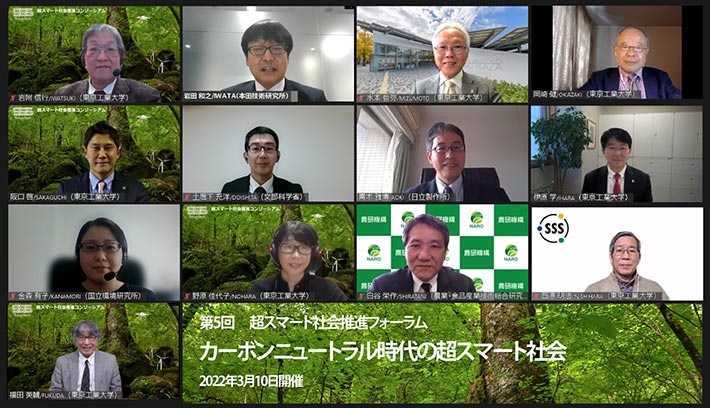
March 10 SSS Promotion Consortium forum participants
Lectures from experts in various fields
Keynote speech
Significant role of hydrogen toward carbon neutrality and contribution to super smart society
Ken Okazaki
Institute Professor and Professor Emeritus, Tokyo Tech Special Advisor, InfoSyEnergy Research and Education Consortium
Tokyo Tech Institute Professor and Professor Emeritus Ken Okazaki spoke about the essential meaning of carbon neutrality, the significant role of hydrogen energy to realize this goal, the combined role of sustainable renewable energy forms, and future prospects for a super smart society. He also pointed out that promotion of interest in and understanding of hydrogen by the general public is essential for the expansion of hydrogen utilization. He mentioned that the optimization of the entire system, including hardware and software, is an important issue in the contribution of hydrogen energy systems to a super smart society.
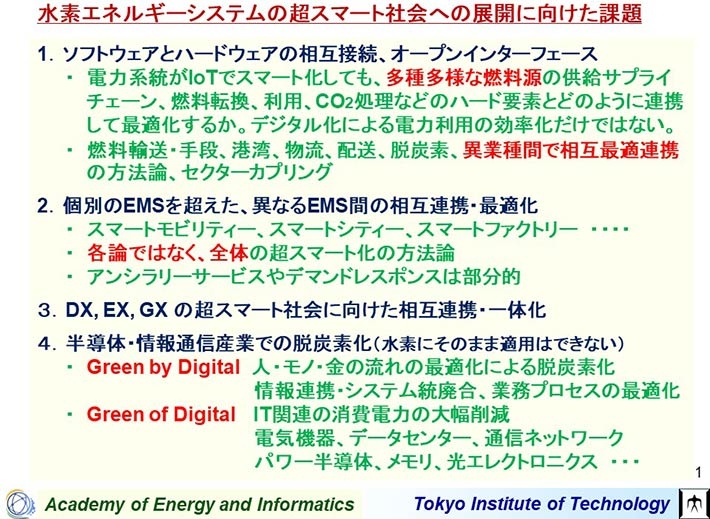
Slide from Okazaki's presentation on future hydrogen energy systems
Invited speech 1
GX by DX: Carbon neutral solutions using digital grid technology
Masahiro Aoki
Corporate Officer and Project Leader, Digital Grid Project, Investment Division, Hitachi Ltd.
During his talk, Hitachi Ltd.'s Masahiro Aoki offered case studies of green transformation (GX) while focusing on digital transformation (DX) and related technologies from the viewpoint of green power supply and demand. After giving examples of how each different companies are working to become carbon neutral, Aoki described his company's efforts to go green and future prospects. As current initiatives, he introduced a system that allows users to proactively tailor the type of power source using digital grid technology, i.e. digital technology that aggregates, analyzes, and utilizes power-related data, and a system that allows visualization of decarbonization and renewable energy use for each product, facility, and service.
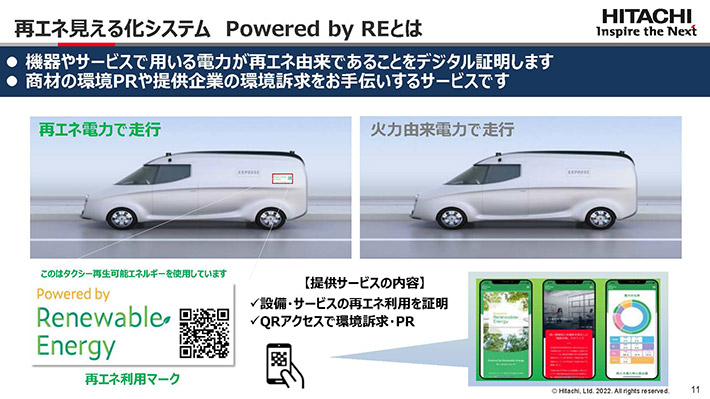
Aoki talking about how decarbonization and use of renewable energy can be visualized
Invited speech 2
Mobility and energy collaboration with Honda eMaaS
Kazuyuki Iwata
Executive Chief Engineer, Innovative Research Excellence, Power Unit & Energy, Honda R&D Co., Ltd. Energy Equipment Business Unit Officer, Life Creation Center, Honda R&D Co., Ltd.
Kazuyuki Iwata, executive chief engineer at Honda R&D Ltd., explained how Honda's various products are linked through IT and renewable energy, and how Mobility as a Service (MaaS) is helping to integrate various means of transportation to make mobility itself a reality. The Honda eMaaS concept, which aims to reduce CO2 emissions in the form of a service, where the vehicle is considered a service, was explained. He also introduced the Honda Mobile Power Pack, a removable, portable battery that can be used in multiple products and can also collect information, as well as a demonstration experiment using it to utilize renewable energy for multiple electric bikes. Finally, he introduced "Moving e," a collaborative effort with Toyota to create simple power transmission and distribution infrastructure that utilizes large buses and the Honda Mobile Power Pack.
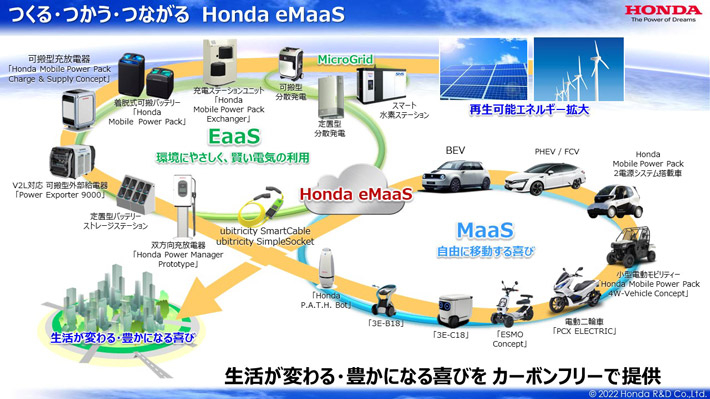
Iwata speaking about Honda's eMaaS concept
Invited speech 3
Lifestyles towards a sustainable decarbonized society
Yuko Kanamori
Senior Researcher, Social Systems Division (Decarbonization Measures Assessment Section), National Institute for Environmental Studies Visiting Associate Professor, School of Engineering, Tokyo Tech
Tokyo Tech's Yuko Kanamori spoke about desired lifestyle changes and related issues associated with the achievement of a decarbonized society and solutions to related social issues. He introduced the achievements of the development team of the Asia-Pacific Integrated Model (AIM), a large-scale model which enables the estimation of greenhouse gas (GHG) emissions. He also mentioned the need for a perspective that balances the realization of a decarbonized society and the resolution of social issues associated with changes in population distribution and other factors. He pointed out the importance of viewing the challenges of achieving a desirable society as a personal matter, given the fact that each household's lifestyle has a significant impact on GHG emissions.
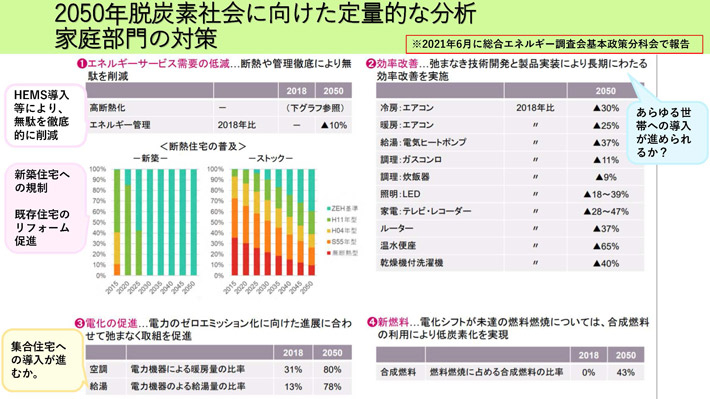
Slide from Kanemori's presentation on desirable lifestyle changes in the future
Invited speech 4
Carbon neutrality with smart agriculture in rural areas
Eisaku Shiratani
Vice president, National Agriculture and Food Research Organization (NARO)
NARO Vice President Eisaku Shiratani spoke about the present and future of smart agriculture technologies and GHG emission reduction technology. He introduced the Ministry of Agriculture, Forestry and Fisheries Green Food System Strategy, which aims to improve productivity and sustainability of the food, agriculture, forestry, and fisheries industries, and the efforts of the National Agricultural Research Organization (NRI) to contribute to this strategy. The National Institute of Agro-Environmental Sciences (NIER) has been working on the reduction of chemical fertilizers, chemical pesticides, organic farming, and food loss, as well as zero emissions, in an integrated manner, from technology development to dissemination, to reduce greenhouse gas emissions, and to promote the use of biotechnology. He explained that the company is accelerating the development of greenhouse gas absorption technologies, for example through the use of charcoal.
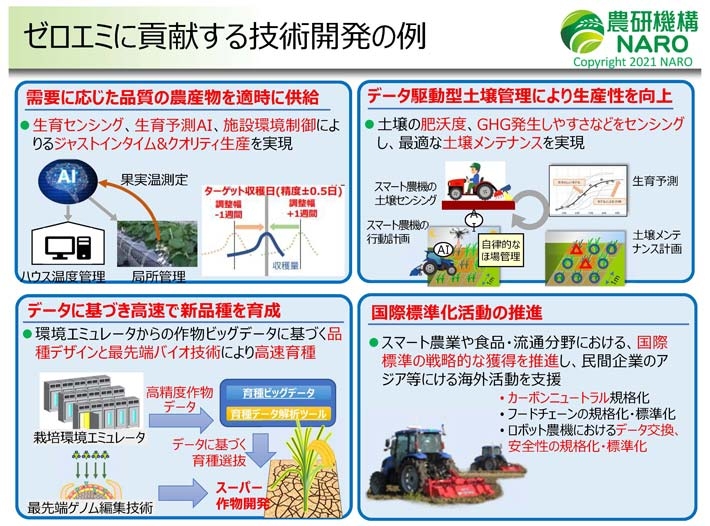
Shirotani providing examples of technologies that can contribute to zero emissions
Invited speech 5
Development of grid-cooperated/distributed energy system Ene-Swallow toward carbon neutrality
Manabu Ihara
Professor, School of Materials and Chemical Technology, Tokyo Tech Director, Tokyo Tech Academy of Energy and Informatics Head, InfoSyEnergy Research and Education Consortium
After highlighting the importance of the combined fields of energy technology development and information science in the transformation of energy systems toward carbon neutrality, the Institute's Professor Manabu Ihara gave an overview of the overall R&D and educational efforts at Tokyo Tech. Next, he gave a comprehensive explanation of Ene-Swallow, a grid-connected/decentralized energy system developed and demonstrated at Tokyo Tech. In particular, he introduced the use of Ene-Swallow to acquire energy-related big data from Ookayama Campus for use in industry-academia collaborative research and education, supporting his ideas with a number of actual examples.
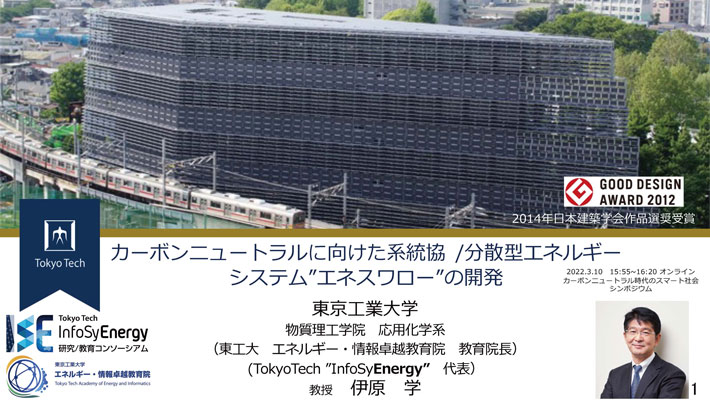
Ihara's presentation on carbon neutrality and Ene-Swallow
Panel discussion
In the second half of the session, a panel discussion involving the five speakers was moderated by Super Smart Society Promotion Committee Chair Eisuke Fukuda, who is also a specially appointed professor at Tokyo Tech's School of Engineering. The group discussed their visions about carbon neutrality and the need for the development specialized human resources to realize this vision.
After the panel discussion, Professor Nobuyuki Iwatsuki, chair of the Consortium Steering Committee, gave a briefing on the progress of the consortium's activities. His message was followed by some closing words from Kei Sakaguchi, dean of the Tokyo Tech Academy for Super Smart Society and professor at the School of Engineering.
There was once again plenty of positive feedback from the participants, including the following comments:
-
Tokyo Tech's research system and strong collaboration with companies and research institutes gave us a sense of the beginning of super smart science and technology in the carbon-neutral era.
-
If Tokyo Tech can take the lead in terms of academia, then I believe that industry and government will move forward together with the Institute.
The Super Smart Society Promotion Consortium will continue to hold forums on cutting-edge technological themes and looks forward to welcoming participants from a broad range of fields into the discussions.
. Any information published on this site will be valid in relation to Science Tokyo.









